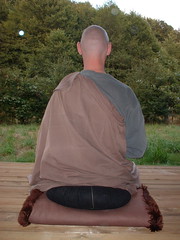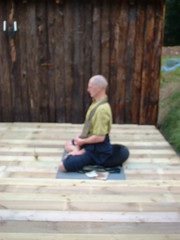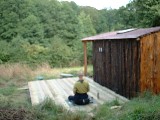Racism, Political Correctness, and Non-Racism
For years in Japan I suffered from being seen through the prism of Japanese stereotypes. One or two individuals in particular seemed to see me as a representative of HAKUJIN NO BUNKA (“white-man’s civilization”) against which Japanese soldiers in WWII were told they were defending Asia. I found it very irritating and frustrating that some Japanese didn’t seem able to relate to me as an individual human being.
As a general rule, I subscribe to the view that racism is wrong. But my attitude to rules is often ambivalent. And I struggle to understand the principle that development often hinges on our preparedness to be wrong, to feel insecure, uncomfortable, unsure of our moral grounding. Marjory Barlow took pains to teach me: "We are all going around trying to be right. It is death and destruction. Being wrong is the best friend we have in this work."
I am not actually sure what my own racial heritage is -- although I am obviously not black, at least on the outside. Whatever half mine is, my sons have inherited my half, together with another half from their Japanese mother.
If one of my sons was subject to a racist insult along the lines of that which I directed at Cohen, i.e. “Fuck off, Jap,” how might I react or respond to that?
I think it would depend very much upon the context.
If my sons, who are enthusiastic members of the local cricket club, vehemently insisted not only (a) that they be allowed to bow to the batsman before bowling each delivery, (b) that the batsman must always bow back; in that case, a response like “Fuck off, Jap” might have meaning other than simply being a racist insult. It might represent a strong refusal to be coerced into conforming to the norms of somebody else’s culture.
The context in which I wrote to Cohen was, as I see it, as follows:
A few years ago, James Cohen began to make his presence known, imposingly, via the internet, to me and other of Gudo Nishijima Roshi’s Dharma-heirs. He has never met me in person. He was not involved in any way with the Shobogenzo translation and publication process -- although he became involved, as Gudo Nishijima’s legal representative, in Gudo Nishijima’s effort to reclaim sole control of the publication process from the original publishers, Windbell Publications. In the course of that process I heard that Cohen severely antagonized one or two people who had worked unselfishly for Windbell over the years.
In the course of this email correspondence between Cohen and other Dharma-heirs, Cohen assiduously ended every missive with some flowery expression of his desire for world peace, or other empty bullshit, interspersed with copious use of punctuation marks to show smiley faces; he then always ended with “Gassho.”
To British tastes, that kind of correspondence smacks of insincerity. It may be essentially just a cultural difference. Many Brits don’t like to hear waiters tell us “Enjoy!”; or to hear “Have a nice day!” parrotted at us as a polite formula -- especially if we sense that the person who says it doesn’t really mean it.
The problem was that, not content to recognize a cultural difference as such, Cohen began an email campaign to coerce other Dharma-heirs to conform to his criteria for politeness. If anybody is interested, I will post up one of Cohen’s emails as evidence.
My instinctive response to such pressure to conform, especially coming from somebody who is many years my junior in Gudo Nishijima’s order, has been to go out of my way not to conform -- for example, by being extremely rude.
This is the historical background going back a number of years.
The more recent background is a controversy in Britain surrounding a fly-on-the-wall TV show called “Big Brother.” It seems to me that millions of gullible Brits, guided dually by the media and their own herd instinct, have been falling over themselves in recent weeks to manifest their anti-racist credentials. We pride ourselves on being a society that respects individual rights -- but just look at us. What a bunch of mindless morons we are.
Where does the pressure to conform to the anti-racist viewpoint come from? It seems to me that it comes largely from the media. I really do not know whether it is fair to talk of “the Jewish media” or not. I have no real evidence to go on, inductively.
From a deductive viewpoint, however, the mirror principle would lead me to think that those who are most commited to the anti-racist viewpoint are like that because they are projecting onto others a tendency which they fear in themselves. And who could defend Old Testament Judaism against the accusation that it a seminal racist ideology.
What I actually wrote to Cohen was as follows:
“Further to my rude email earlier on, and having reflected on it, I have a question about politeness in Buddhism. As a rude non-Buddhist non-monk, I would like to ask my question to the polite very Buddhist monk Jundo James Cohen:
Venerable Master Cohen! In Buddhism, is to be polite a choice, or is it an obligation, like a commandment?
If you say that it is a choice, then I would like to say to you, Venerable Master Cohen: Fuck you, you poser.
If you say that it is a kind of commandment, then I would like to say to you simply: Fuck off, jewboy.
I feel extreme anger to you, Cohen, because of the mirror principle. You represent everything that is unnatural, pretentious, insincere about the human condition, about my condition.”
That was the context of my racist insult.
In the end, racism is a view, to which people conform en masse. Anti-racism, political correctness, is also a view, to which people conform en masse. But non-racism, as the abandonment of both those views, cannot be a mass movement. It is the effort of one individual, in one chunk of existence-time, to get the whole body free of views.
When I was working closely with Gudo Nishijima in the 1980s, he was of the view that world history was moving inexorably in the direction of Jewish hegemony, and that the realistic Buddhist attitude in these circumstances might be to seek peaceful accommodation.
I don’t know if his view has changed since then, but I suspect that what he wrote in his Dogen Sangha blog last year about the United States being the world’s policeman, may be understood in the above light.
If that is Buddhist realism, Gudo can keep it. If that is Buddhist realism, I’ll strive to follow a different way: the way of non-Buddhist, non-realism.
I bow not to the pressure to conform, but to one real individual.
[To the One] who, as the giving up of all views,
Taught the Straight Truth,
Using compassionate means:
I bow to him: Gautama




